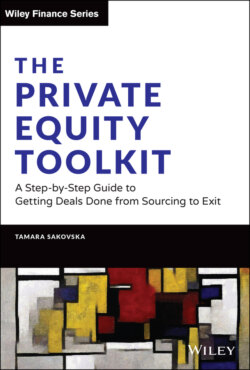Читать книгу The Private Equity Toolkit - Tamara Sakovska - Страница 34
4. Build a network of experts and company executives to fill knowledge gaps
Оглавление
We are more than halfway through the Thematic Deal Sourcing ICEBERG Roadmap™! Now that you have done a good amount of thorough sector research, you should have a good sense of the areas where there are gaps in your knowledge and who can help you at this stage. Apart from striving to perfect your understanding of the industry, you should begin to think about building productive relationships with people who might assist you with transactions down the road. Who can help you generate actionable deal ideas, introduce you to companies or even serve as a Chairman or a Chief Executive Officer (“CEO”) in a target company?
There are numerous resources at your disposal:
The existing network of your firm. If you are working on an industry already known to your firm (i.e. someone worked on a similar investment in a different geography), it is a good idea to connect with your colleagues and understand the sources of insight that they found valuable. What existing network does your firm already have and who can help you with introductions?
Your personal network. Next, explore your own network, including any second or third-degree connections that you have: Can you detect any actionable links to the industry that you are researching?
Reaching out to industry experts on your own. Through your sector research, you might have already identified prominent figures in the sector. Who is regularly talking to the press about key sector issues? Who are keynote speakers at industry events? Who is on the board of the industry association? Are there any retired executives currently working in an advisory capacity? Are there influential industry bloggers?
Networking at industry events. Make an effort to go to industry conferences and trade fairs to meet people working in the sector. Are there industry experts or company executives that you might be interested in meeting?
Expert networks and headhunters. This strategy will require a budget from your fund; however, it will allow you to conduct a bespoke and precise search. You will be able to identify a number of industry experts, current or retired company executives as well as any other participants of the industry's value chain, such as customers, suppliers or regulators.
Other intermediaries. Experienced accountants, lawyers, consultants and bankers generally have sector expertise and sometimes develop truly deep and unique insights into the industry, albeit shaped by the perspective of their profession. If they already work with your firm on other transactions, they should be willing to engage in a thoughtful dialogue with you and potentially introduce you to more people in the industry.
This brings us to a sensitive and a potentially awkward subject. As you are working on enhancing your connectivity in the sector, it is very important to keep in mind what may motivate the people you meet to spend their time with you. Sometimes your relationship will be very clear as some industry participants will work with you only on a retained basis and get an hourly or daily rate for their services. At other times, however, some experts may be talking to you as a gesture of goodwill. Why? Some of them might simply want recognition as a sector authority and an industry spokesperson. Others might be genuinely interested in your work and will, from an investor's point of view, find your insights educational. Finally, there will be some people who will hope to monetize their relationship with your fund in the future, either as retained advisers or members of an executive management team in a target company.
I was advised by my senior colleagues early in my career to approach industry and deal networking with caution and develop relationships as a two-way street. Even though I might be dealing with senior industry executives who know a lot more about the sector than I, I may still be able to provide them with something valuable—such as an important introduction, access to my network or our firm's take on the industry, provided that our insights are non-confidential. Sharing articles, exchanging views, organizing industry dinners or thematic away days at my firm have proven to be productive ways to keep in touch and ensure that my network remained active.
However, my colleagues maintained that I stay cautious throughout all of this. Why? Because it is important that my intentions remained completely transparent to the people assisting our fund. I needed to discern genuine goodwill from an expectation of immediate or future fees, especially those that had not been agreed upon or earned. In my personal experience (and in that of my peers), the only way to avoid a misunderstanding of this nature was to have an upfront conversation about how our fund worked with outside parties and enter into any written agreements fairly early in the project.
Finally, it is important to recognize that apart from getting truly valuable insights, your new network might provide you with information that is biased, speculative or outdated. Some industry participants may offer a perspective that is too narrow and rigid, driven by their subjective experience in the sector. Others may be so focused on their own visibility in the industry, talking to the press and other matters of personal prestige that they might lose sight of the fact that their sector views have long since become stale. For this reason, I recommend that you establish the credibility of your new contacts early on and verify some of their views with a couple of alternative sources of information. This is a good way to ensure that people entering your network are knowledgeable, thoughtful and can serve as trustworthy sources in your quest to develop proprietary insights into an industry.
